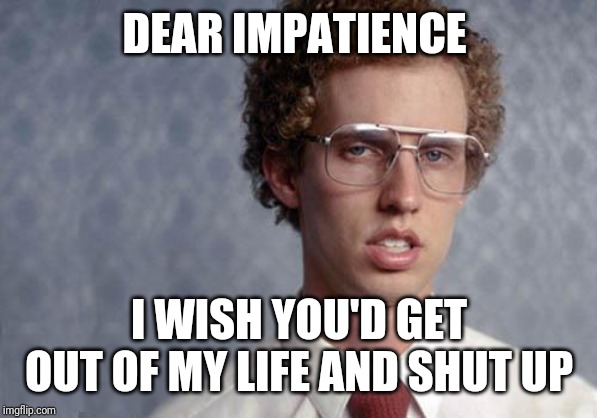Patience, patience.

I once read a story about John Hegarty, or rather one of his employees. This junior creative came to see John to ask for a raise. When John questioned why he was asking for more money so early in his career he replied that he wanted to be out of advertising within ten years. John’s response was to laugh and explain that it took him ten years to finally come up with his first good ad.
If it took a legend like John a decade to produce a decent piece of work, what hope do the rest of us have?
Well, no need to despair. Instead you should accept the amount of time it takes to become someone who can create work of quality, and understand that patience is not only a virtue, but also a necessary element of the process.
Sure, it’s possible to create something ‘great’ in the early years of your career, but the ad industry is littered with examples of people who needed quite a while to reach any kind of a peak.
Another Hegarty-adjacent story of patience can be found in his book, Hegarty on Creativity. In it he explains that Saatchi and Saatchi spent eight years being unsuccessful and unknown before finally reaching the formula which allowed them to launch into the stratosphere of the advertising world. And that was with Charles Saatchi at the helm, a proven creative genius.
Talking of proven creative geniuses and eight years, that was roughly the amount of time that elapsed between the inception of Doyle Dane Bernbach, and the iconic VW Lemon campaign that made its name. Yes, another creative genius took the best part of a decade to deliver a piece of work commensurate with his current reputation.
Back in the 70s, it took David Abbott around eight years, and a failed attempt at a start-up, to go from being the CD of DDB London to one of the founding partners of Abbott Mead Vickers. Of course he produced some very good work in that time, but he needed a particular set of circumstances, and several further years to progress to the status of legend.
As a keen reader of music biographies, I can also tell you that success did not simply fall into the laps of many of your idols. From the Beatles, to the Stones, to Stevie Wonder, to Quincy Jones, to David Bowie, each faced rejection, line-up changes, years in the wilderness and several false starts before becoming the Hall-of-Famers we know today.
I bring these stories to your attention for two reasons: the first is to allay any fears you might have about the speed of your progress or the success of your start-up. If the greats needed time to practice the age-old process of trial and error, chances are you will too. Creative brilliance is a marathon, not a sprint, so settle in for the long haul.
The second reason is to be aware of other people going through the same set of circumstances. If it takes time to be really good, that time is going to be spent being various shades of so-so. A team might skip their way to a Cannes Lion in their first couple of years then win nothing for the next five. That doesn’t necessarily mean the early award was a fluke, or that the wilderness years were a truer reflection of their talent. It means that experience is hard-won, and often arrives more quickly through failure than success.
You’re not born good or bad at creativity. You have to learn it to earn it, and it might take a while to arrive at the agency or boss that brings the best out of you. If your sense of humour doesn’t chime with that of the person assessing your work, you’re going to be treading water while he or she throws your scripts in the bin.
Sometimes an appropriate boss or agency arrives to meet your greatness, but sometimes it’s the circumstances. Perhaps the 1950s were not ready for Bill Bernbach, but the creative leap of the 1960s laid the welcome mat for his work. In retrospect, the grim 1970s didn’t feel quite in tune with the glossy, financially focussed Saatchi brothers, but when Thatcher ushered in the individualism of the 1980s, they fit that decade like a glove.
You might find yourself feeling as if the world of social media, programmatic and SEO isn’t for you, but if you hang on, you might find that AI creates a new context that is exactly what you need. Someone is going to make that breakthrough. It could be the team in the next office (or at the next open-plan desk), a kid entering the industry from a couple of unproductive years in video game design, or you.
So take heart from the wilderness years and wrong turns of the very best of our industry. If you want to go far, it’s going to take a while.